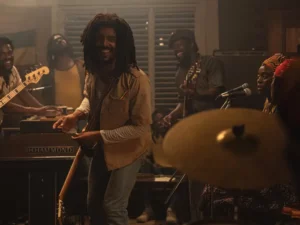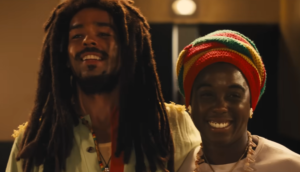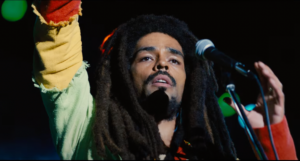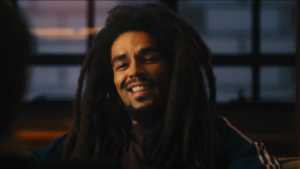Bob Marley: One Love (2024) review
Dir. Reinaldo Marcus Green
By: Steve Pulaski
Rating: ★½
Bob Marley: One Love pulls the cruelest bait-and-switch any musical biopic has pulled in recent memory. It drops us into in 1976 Jamaica, when Bob Marley (Kingsley Ben-Adir) is already a star. An externally laidback, lanky figure with a big smile and bouncing dreadlocks, he’s gearing up to play a peace concert in Kingston in order to help heal the violent and political landscape. Jamaica is an all-out warzone, thrust into chaos brought on by dueling political entities and gang violence.
This opening sets the stage for a movie that, contrary to recent biopics like Bohemian Rhapsody and Elvis, carves out a specific, pivotal time in a legend’s career rather than race through his/her life in 120 minutes or less. I call this a bait-and-switch because Bob Marley: One Love turns what could be a small but elaborate canvas into a morass of faintly rendered sketches. This is a film so frustratingly underwritten, to the point of incoherence, that a work of equal length featuring nothing more than Marley noodling on his guitar might’ve given us more insight into the man himself.

Back to the story. Right before the Kingston concert is set to commence, a pair of gunmen break into Marley’s headquarters, shoot his wife, Rita (Lashana Lynch), and attempt to assassinate the singer. The couple, including Marley’s friend and fellow musician, Don Taylor (Anthony Welsh), are lucky to escape, but it’s abundantly clear that if Marley wants to live, he must flee his homeland.
The remainder of One Love is set over the subsequent two years where Marley relocates to London, forms the band “the Wailers,” writes and records the album Exodus, and grapples with becoming one of the biggest musical figures of his generation while suppressing personal trauma.
This is an ideal point in Marley’s short-but-indelible time on this Earth to capture in a movie, but director/co-writer Reinaldo Marcus Green (King Richard), along with fellow writers Terence Winter, Frank E. Flowers, and Zach Baylin almost couldn’t botch this project more. The time-period of 1976 – 1978 has no shortage of elements on which to touch: Marley’s status as a militant political figure turned pop icon; Marley and Rita’s marriage despite his rampant infidelity; and the impact of his torn homeland and paternal abandonment on his psyche. Instead of fleshing out the innerworkings of these ideas, the script gives us a vague smattering of each, suggesting copious rewrites.

Contrarily, what should be a centrally rooted film is instead a pastiche of Marley’s career, the production of his most significant album, reggae’s rise as entertainment and a political tool, and whatever else the writers throw in and don’t care to develop. To boot, One Love doesn’t contextualize the Jamaican political landscape at the time. It’s a bold move to rely on a predominately American audience to have the background knowledge to make anything Marley does in this movie appear as impacting and meaningful as it was.
What backstory we do get, in the regard of Marley’s white father abandoning him at a young age and Marley and Rita’s courtship, is shown in ambiguous and hurried flashbacks that are cloaked in frothy, sunlit colors by cinematographer Robert Elswit. It amounts to the perfect encapsulation of the larger film. Pretty and vapid. Most of the characters not named Bob Marley aren’t afforded any development either, least of all Rita, who is portrayed as devoted to a fault, leaving Lashana Lynch one scene to shine, and naturally, it’s a nasty fight between the two lovers.

What about the songs, you might ask? Maybe the most bitter aspect of One Love is how it uses some of Marley’s most recognizable tunes as needle-drop moments for the soundtrack. Cue the montage set to “Get Up, Stand Up,” or how “Jammin” appeared to have been written in a few fleeting minutes. The backstory regarding the development of these songs boils down to occasional scenes of Marley sitting by himself, morosely silent or strumming his guitar. These shots convey the trauma and personal hurt festering inside Marley; like most films these days, it plays these familiar themes and affords them similarly scant development.
Before you know it, Marley is on a European Tour, and not even the concert scenes provide One Love the kind of spark (figurative or literal) one gets when throwing on one of Skip’s greatest tracks. The settings themselves match the characters insofar that they might as well be cardboard cutouts. Outside of Kingsley Ben-Adir’s noble outing as the titular singer (his vocals are mixed with Marley’s), nobody shines. How can they? They’d need the opportunity, and a halfway compelling script — two of many elements Bob Marley: One Love proves early it isn’t intent on providing, rendering a shell of a story told in its wake.
NOTE: Bob Marley: One Love is now playing exclusively in theaters.
NOTE II: While Bob Marley: One Love might surely end up being one of the biggest disappointments of 2024, the renewed attention it will give Bob Marley will be deserved, at least. Let us not forget his son, Ziggy, and one of his most inspiring and tremendous contributions to the culture too.
Starring: Kingsley Ben-Adir, Lashana Lynch, Anthony Welsh, James Norton, Tosin Cole, Aston Barret Jr, Sevana, Hector Lewis, Michael Gandolfini, Nadine Marshall, and Henry Douthwaite. Directed by: Reinaldo Marcus Green.
About Steve Pulaski
Steve Pulaski has been reviewing movies since 2009 for a barrage of different outlets. He graduated North Central College in 2018 and currently works as an on-air radio personality. He also hosts a weekly movie podcast called "Sleepless with Steve," dedicated to film and the film industry, on his YouTube channel. In addition to writing, he's a die-hard Chicago Bears fan and has two cats, appropriately named Siskel and Ebert!


